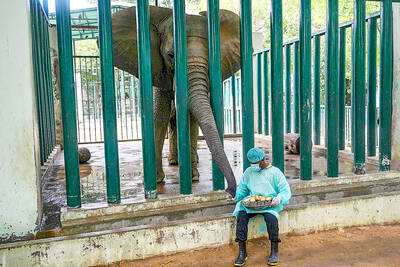South Korea plans to stop using GPS monitoring to enforce quarantines, and is also ending daily checkup calls to low-risk COVID-19 cases as the fast-spreading Omicron variant of SARS-CoV-2 overwhelms health and government workers.
The speed of transmissions has made it impossible to maintain a tight medical response, Korea Disease Control and Prevention Agency commissioner Jeong Eun-kyeong said yesterday.
The agency reported 38,691 new cases of the virus, a nine-fold increase from levels seen last month, when Omicron became the country’s dominant strain.

Photo: Bloomberg
Jeong said that the country could see daily jumps of 130,000 or 170,000 by late February.
South Korea had been seen as a success during the earlier part of the pandemic, after it contained infections and hospitalizations more effectively than most countries in the West. Health authorities worked closely with biotech companies to ramp up laboratory tests, and aggressively mobilize technological tools and public workers to trace contacts and enforce quarantines.
However, the country’s strengths have been rendered irrelevant by the unprecedented spike in infections fueled by the Omicron variant, which has stretched health and administrative resources.
Officials had already been forced to expand at-home treatments, reduce quarantine periods, and reshape testing policy around rapid antigen test kits, despite concerns over their reliability, to save laboratory tests for people at higher risk due to age or pre-existing medical conditions.
The plans to further ease monitoring and quarantines came as health and public workers struggle to keep up with the near 150,000 people being treated at home for mild or moderate symptoms, which have led to delays in drug prescriptions and has paralyzed contact tracing.
Officials say that public workers who had been monitoring virus carriers through GPS-enabled smartphone apps are now to be assigned to help with at-home treatments.
Virus carriers will no longer be required to report to local health offices when they leave home to visit doctors, while their cohabiting family members can now freely go out to buy food, medicine and other essentials.
Low-risk virus carriers in their 50s or younger, and have no pre-existing medical conditions, will now be left to monitor their conditions on their own and contact local hospitals if their symptoms worsen. Health workers are still to make daily checkup calls to people in their 60s and older, or to those with pre-existing conditions.
“We are planning to transition toward an anti-virus strategy that’s concentrated on maintaining essential social functions while dealing with huge numbers of infections and people placed under quarantine,” Jeong said.

NO EXCUSES: Marcos said his administration was acting on voters’ demands, but an academic said the move was emotionally motivated after a poor midterm showing Philippine President Ferdinand Marcos Jr yesterday sought the resignation of all his Cabinet secretaries, in a move seen as an attempt to reset the political agenda and assert his authority over the second half of his single six-year term. The order came after the president’s allies failed to win a majority of Senate seats contested in the 12 polls on Monday last week, leaving Marcos facing a divided political and legislative landscape that could thwart his attempts to have an ally succeed him in 2028. “He’s talking to the people, trying to salvage whatever political capital he has left. I think it’s

Polish presidential candidates offered different visions of Poland and its relations with Ukraine in a televised debate ahead of next week’s run-off, which remains on a knife-edge. During a head-to-head debate lasting two hours, centrist Warsaw Mayor Rafal Trzaskowski, from Polish Prime Minister Donald Tusk’s governing pro-European coalition, faced the Eurosceptic historian Karol Nawrocki, backed by the right-wing populist Law and Justice party (PiS). The two candidates, who qualified for the second round after coming in the top two places in the first vote on Sunday last week, clashed over Poland’s relations with Ukraine, EU policy and the track records of their

UNSCHEDULED VISIT: ‘It’s a very bulky new neighbor, but it will soon go away,’ said Johan Helberg of the 135m container ship that run aground near his house A man in Norway awoke early on Thursday to discover a huge container ship had run aground a stone’s throw from his fjord-side house — and he had slept through the commotion. For an as-yet unknown reason, the 135m NCL Salten sailed up onto shore just meters from Johan Helberg’s house in a fjord near Trondheim in central Norway. Helberg only discovered the unexpected visitor when a panicked neighbor who had rung his doorbell repeatedly to no avail gave up and called him on the phone. “The doorbell rang at a time of day when I don’t like to open,” Helberg told television

A team of doctors and vets in Pakistan has developed a novel treatment for a pair of elephants with tuberculosis (TB) that involves feeding them at least 400 pills a day. The jumbo effort at the Karachi Safari Park involves administering the tablets — the same as those used to treat TB in humans — hidden inside food ranging from apples and bananas, to Pakistani sweets. The amount of medication is adjusted to account for the weight of the 4,000kg elephants. However, it has taken Madhubala and Malika several weeks to settle into the treatment after spitting out the first few doses they